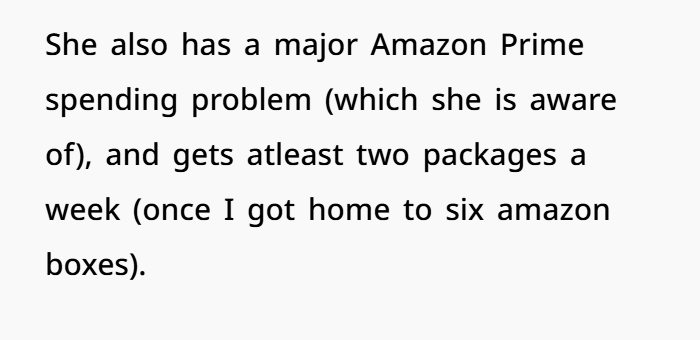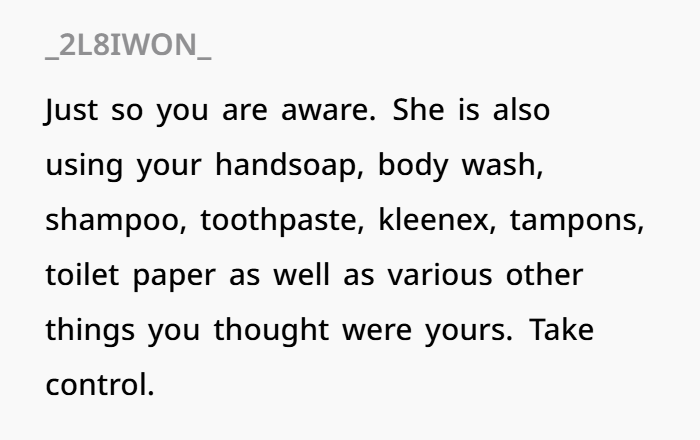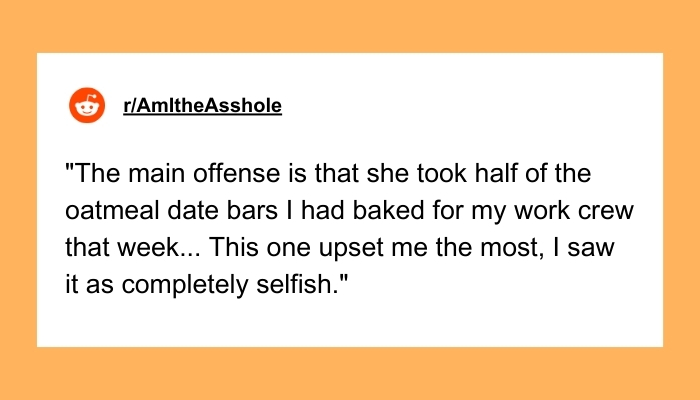Tenant Ditches Apartment And Snack-Stealing Roommate Who Keeps Eating Their Food But Denies It
When it comes to shared living arrangements, there’s one golden rule: never steal your roommate’s food. Because once that yogurt disappears, so does the trust. Living with a roommate can be fun—until they start looking at your cereal box like it’s free for all.
From fridge theft to bathroom drama or passive-aggressive sticky notes, sharing a rental space often turns into a battle of patience. Sometimes, you feel like you need a roommate agreement and a lock on the pantry just to survive.
One Reddit user recently shared their nightmare experience with a food-stealing, gaslighting roommate—a person who eats like a raccoon and lies like a dishonest landlord. Stories like these show why it’s important to understand your tenant rights, set clear boundaries, and use smart conflict resolution strategies in any rental property.
Read for more info Reddit
Living with a roommate is all fun and games until your food disappears and denial becomes their favorite seasoning
One netizen moves out of a shared apartment after their middle-aged roommate starts eating their food and keeps lying about it














The netizen decides to move out after confronting their roommate about stealing their food, but being told they just ate too much and don’t remember
The original poster (OP), a 28-year-old working professional, had been living in a shared rental property with their 47-year-old roommate—who acted more like a rebellious teenager—when things started going downhill.
At first, everything seemed fine. But over time, the roommate transformed into a one-woman snack thief, turning daily life into a silent war over food. Bananas vanished from the counter. Creamer bottles were found empty in the fridge. And trail mix? It was as if it magically teleported into her stomach.
The final straw came with the mysterious disappearance of homemade oatmeal date bars. The OP had baked them for their hardworking team after a stressful week at work—a sweet way to support their colleagues. But half the tray disappeared overnight. No crumbs, no explanation—just gone.
When the OP addressed the issue, hoping for a reasonable chat and roommate conflict resolution, they were met with denial and gaslighting. The roommate claimed they must have “just eaten more than they thought.” That’s when it became clear: this wasn’t just about food. It was about respect, trust, and broken boundaries in a rental agreement.
Living with roommates requires clear property sharing etiquette and strong communication. Without that, small issues can quickly grow into major roommate disputes that affect your daily life and mental peace.
This wasn’t a case of someone struggling financially. The OP’s roommate had no problem ordering organic, gluten-free groceries and receiving Amazon packages regularly. But when it came to buying her own snacks—like trail mix or even store-brand ice cream—she somehow always came up short.
At this point, it wasn’t about the money. It was about audacity, dishonesty, and clear toxic roommate behavior.
One of the most frustrating parts of this experience was the gaslighting. For those unfamiliar, gaslighting is a serious form of emotional manipulation. It happens when someone lies or distorts facts to make you doubt your memory, feelings, or reality—usually to avoid taking responsibility.
You know you didn’t eat half a tray of oat bars in your sleep. But after the gaslighter says, “You probably just forgot,” or “You’re overreacting,” you start questioning yourself. That’s exactly how mental health issues in shared housing can start.
Gaslighters use common phrases like:
- “You’re imagining things.”
- “You must’ve done it without realizing.”
- “You always make a big deal out of nothing.”
Don’t fall for it. In any roommate arrangement, it’s crucial to trust your gut, document your experiences, and set clear tenant communication boundaries. Whether that means keeping notes, texting instead of verbal discussions, or even updating your roommate agreement, protect your peace.
If your roommate constantly makes you feel like you’re the problem every time they cross the line, it’s not just a bad habit—it’s a big, blinking roommate red flag.
At one point, the OP (original poster) strongly considered baking a tray of “special” brownies—the kind that sends someone on a direct trip to the bathroom—as a trap for their dishonest roommate. But in the end, morality won. Instead of revenge, the OP packed their things, found a new rental place, and took their precious oatmeal bars with them.
Sometimes, that’s the best way to deal with toxic roommate behavior—move on, and protect your peace.
Living with roommates isn’t always easy. When the kitchen turns into a battleground and shared spaces fill with silent tension, it’s time to revisit the basics of co-living etiquette.
To help renters navigate tricky roommate situations, Bored Panda spoke with Lisa Mirza Grotts, a well-known etiquette expert. Her golden rule?
“Shared space, shared grace.”
This means:
- Respecting boundaries
- Cleaning up after yourself
- Communicating openly when issues arise
Grotts emphasizes that in shared housing, a key rule is simple:
If you didn’t buy it, don’t touch it.
“Don’t be the fridge freeloader,” she says. If it’s not yours, hands off. That includes snacks, sauces, and even that tempting tub of ice cream.
She also recommends labeling your food. It’s not petty—it’s smart.
“Label with love,” Grotts advises. A name on your yogurt isn’t rude—it’s self-preservation in a shared kitchen.
Want to avoid roommate drama over groceries? Try these tips:
- Use labeled containers or bins in the fridge
- Discuss food-sharing boundaries early
- Keep personal items separate to avoid confusion
When a roommate keeps crossing boundaries, even after polite hints, it’s time to speak up. Grotts recommends a calm and respectful approach:
“Hey, I’d really appreciate it if my snacks stayed mine.”
You don’t need to start a fight—but you do need to stand up for yourself.
And if your roommate still doesn’t get it? Bring in a neutral third party—like a landlord, property manager, or resident advisor—to help mediate.
At the end of the day, shared housing requires communication, respect, and a few clever strategies—like labeled yogurt and honest conversations.
People in the comments advised the netizen to put a lock on their food, or tamper with it to teach their roommate a lesson










